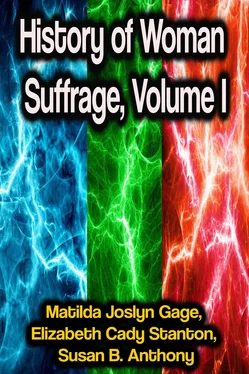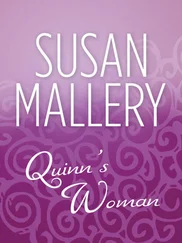Among the immediate causes that led to the demand for the equal political rights of women, in this country, we may note three:
1. The discussion in several of the State Legislatures on the property rights of married women, which, heralded by the press with comments grave and gay, became the topic of general interest around many fashionable dinner-tables, and at many humble firesides. In this way all phases of the question were touched upon, involving the relations of the sexes, and gradually widening to all human interests—political, religious, civil, and social. The press and pulpit became suddenly vigilant in marking out woman's sphere, while woman herself seemed equally vigilant in her efforts to step outside the prescribed limits.
2. A great educational work was accomplished by the able lectures of Frances Wright, on political, religious, and social questions. Ernestine L. Rose, following in her wake, equally liberal in her religious opinions, and equally well informed on the science of government, helped to deepen and perpetuate the impression Frances Wright had made on the minds of unprejudiced hearers.
3. And above all other causes of the "Woman Suffrage Movement," was the Anti-Slavery struggle in this country. The ranks of the Abolitionists were composed of the most eloquent orators, the ablest logicians, men and women of the purest moral character and best minds in the nation. They were usually spoken of in the early days as "an illiterate, ill-mannered, poverty-stricken, crazy set of long-haired Abolitionists." While the fact is, some of the most splendid specimens of manhood and womanhood, in physical appearance, in culture, refinement, and knowledge of polite life, were found among the early Abolitionists. James G. Birney, John Pierpont, Gerrit Smith, Wendell Phillips, Charles Sumner, Maria Weston Chapman, Helen Garrison, Ann Green Phillips, Abby Kelly, Paulina Wright Davis, Lucretia Mott, were all remarkably fine-looking.
In the early Anti-Slavery conventions, the broad principles of human rights were so exhaustively discussed, justice, liberty, and equality, so clearly taught, that the women who crowded to listen, readily learned the lesson of freedom for themselves, and early began to take part in the debates and business affairs of all associations. Woman not only felt every pulsation of man's heart for freedom, and by her enthusiasm inspired the glowing eloquence that maintained him through the struggle, but earnestly advocated with her own lips human freedom and equality. When Angelina and Sarah Grimke began to lecture in New England, their audiences were at first composed entirely of women, but gentlemen, hearing of their eloquence and power, soon began timidly to slip into the back seats, one by one. And before the public were aroused to the dangerous innovation, these women were speaking in crowded, promiscuous assemblies. The clergy opposed to the abolition movement first took alarm, and issued a pastoral letter, warning their congregations against the influence of such women. The clergy identified with anti-slavery associations took alarm also, and the initiative steps to silence the women, and to deprive them of the right to vote in the business meetings, were soon taken. This action culminated in a division in the Anti-Slavery Association. In the annual meeting in May, 1840, a formal vote was taken on the appointment of Abby Kelly on a business committee and was sustained by over one hundred majority in favor of woman's right to take part in the proceedings of the Society. Pending the discussion, clergymen in the opposition went through the audience, urging every woman who agreed with them, to vote against the motion, thus asking them to do then and there, what with fervid eloquence, on that very occasion, they had declared a sin against God and Scripture for them to do anywhere. As soon as the vote was announced, and Abby Kelly's right on the business committee decided, the men, two of whom were clergymen, asked to be excused from serving on the committee.
Thus Sarah and Angelina Grimke and Abby Kelly, in advocating liberty for the black race, were early compelled to defend the right of free speech for themselves. They had the double battle to fight against the tyranny of sex and color at the same time, in which, however, they were well sustained by the able pens of Lydia Maria Child and Maria Weston Chapman. Their opponents were found not only in the ranks of the New England clergy, but among the most bigoted Abolitionists in Great Britain and the United States. Many a man who advocated equality most eloquently for a Southern plantation, could not tolerate it at his own fireside.
The question of woman's right to speak, vote, and serve on committees, not only precipitated the division in the ranks of the American Anti-Slavery Society, in 1840, but it disturbed the peace of the World's Anti-Slavery Convention, held that same year in London. The call for that Convention invited delegates from all Anti-Slavery organizations. Accordingly several American societies saw fit to send women, as delegates, to represent them in that august assembly. But after going three thousand miles to attend a World's Convention, it was discovered that women formed no part of the constituent elements of the moral world. In summoning the friends of the slave from all parts of the two hemispheres to meet in London, John Bull never dreamed that woman, too, would answer to his call. Imagine then the commotion in the conservative anti-slavery circles in England, when it was known that half a dozen of those terrible women who had spoken to promiscuous assemblies, voted on men and measures, prayed and petitioned against slavery, women who had been mobbed, ridiculed by the press, and denounced by the pulpit, who had been the cause of setting all American Abolitionists by the ears, and split their ranks asunder, were on their way to England. Their fears of these formidable and belligerent women must have been somewhat appeased when Lucretia Mott, Sarah Pugh, Abby Kimber, Elizabeth Neal, Mary Grew, of Philadelphia, in modest Quaker costume, Ann Green Phillips, Emily Winslow, and Abby Southwick, of Boston, all women of refinement and education, and several, still in their twenties, landed at last on the soil of Great Britain. Many who had awaited their coming with much trepidation, gave a sigh of relief, on being introduced to Lucretia Mott, learning that she represented the most dangerous elements in the delegation. The American clergymen who had landed a few days before, had been busily engaged in fanning the English prejudices into active hostility against the admission of these women to the Convention. In every circle of Abolitionists this was the theme, and the discussion grew more bitter, personal, and exasperating every hour.
The 12th of June dawned bright and beautiful on these discordant elements, and at an early hour anti-slavery delegates from different countries wended their way through the crooked streets of London to Freemasons' Hall. Entering the vestibule, little groups might be seen gathered here and there, earnestly discussing the best disposition to make of those women delegates from America. The excitement and vehemence of protest and denunciation could not have been greater, if the news had come that the French were about to invade England. In vain those obdurate women had been conjured to withhold their credentials, and not thrust a question that must produce such discord on the Convention. Lucretia Mott, in her calm, firm manner, insisted that the delegates had no discretionary power in the proposed action, and the responsibility of accepting or rejecting them must rest on the Convention.
At eleven o'clock, the spacious Hall being filled, the Convention was called to order. The venerable Thomas Clarkson, who was to be President, on entering, was received by the large audience standing; owing to his feeble health, the chairman requested that there should be no other demonstrations. As soon as Thomas Clarkson withdrew, Wendell Phillips made the following motion:
Читать дальше












